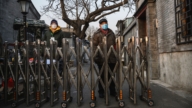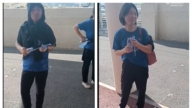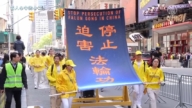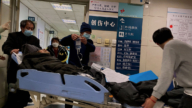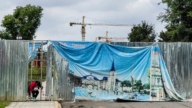【新唐人2013年07月25日讯】中共在韩战片《英雄儿女》中塑造出来的所谓英雄人物王成,给不少大陆民众留下了深刻的印象。不过,日前,真实的“英雄”现身,却透露自己是在战场被俘,回中国后遭当局打压,还禁止他曝光。现居辽宁锦州的蒋庆泉一句“我是战俘不是英雄”,揭开了这段埋藏多年的秘密。在韩战期间,中共介入朝鲜是“侵略行为”的真相,也再度被曝光。
韩战是二战后人类规模最大、伤亡最惨烈的一场战争。中共派兵百万以所谓“志愿军”名义进入朝鲜参战,随着韩战的真相被逐渐揭开的同时,韩战影片《英雄儿女》也被揭穿是造假。
1964年的电影《英雄儿女》,片中男主角高喊“为了胜利,向我开炮”。让王成这个人物成为无数中国民众心目中的英雄典范。
电影《英雄儿女》是根据当时战地报导《顽强的声音──记步话机员蒋庆泉》改编的,在文化大革命期间,中国有很多电影被批判、禁放,然而这部宣扬中国“抗美援朝”的洗脑电影,却被大肆宣传,主角蒋庆泉摇身一变成为中共塑造的超级英雄。
重庆市民韩良:“共产党为什么要歌颂这个人?歌颂这件事情?他是叫这些人去学习他,为共产党卖命,但是都不讲这个人后来的待遇。”
电影里的主角最后死于战场,然而真实的主角却没有死,他在战场上被俘虏,回国后遭执政当局打压,禁止曝光。
85岁的蒋庆泉,在接受香港媒体采访时表示,他曾经跟美国兵肉博,差点被刺刀捅穿心口。他在1953年4月18号石岘洞北山激战中昏倒,被送进了美军医院。
因蒋庆泉的名字出现在板门店交换战俘名单中,按中共规矩不能被宣传,更不能被评为英雄。
大陆深圳政论专栏作家朱健国:“这不影响当局继续按照这样的版本塑造英雄人物,因为他们是要人民学习这样的事,宣传出来的这个形象,而不是他实际怎么样,这也是这么多年,连学雷峰都学不起来的一个原因,随着知道真实的雷峰和宣传里的雷峰,那差距有多远。”
曾经加入国民军的蒋庆泉,1949年转入中共军队。在韩战结束后回到家乡的他,每天认罪写检讨。
“一切都没了,打那些仗,前途打没了,是啥啥都打没了,我也感到了伤心。”
“志愿军英雄”的美名并没有给蒋庆泉带来任何实惠,除了每个月800元的老兵津贴,剩下的就是地方政府打着他的旗号作宣传,却没给他任何好处。
几十年来,中共当局一直宣传,朝鲜战争的起因,是因为美国派兵侵略朝鲜,而他们参战的名义是所谓的“保家卫国”。
住在美国的华侨黎小姐,刚参观过韩战纪念馆,她惊讶的说,原来她从小被灌输的知识是错误的。
美国华侨黎小姐:“这么多年都受骗了,还是从课本上学的呢,都说是美国侵略了朝鲜,那为什么韩国人还到这里来送花圈呢?看起来关系蛮好的,我就问我先生,我先生是美国人,他就说不是美国侵略朝鲜,而是朝鲜有个很残暴的统治者,然后美国人为了帮助那里的人们去支援。”
1950年10月1号,朝鲜领导人金日成致信当时的中共党魁毛泽东,提出出兵援助朝鲜的请求,10月19号,中共在没有对美国正式宣战的情况下,派遣所谓的民间志愿者进入朝鲜参战,为的是不给美国对中国宣战的理由。
1951年2月1号,联合国大会通过第498号决议,认定中共介入朝鲜是“侵略行为”。包括美国在内的16个国家则联手支援韩国,对抗朝鲜的侵略。
1953年7月27号,双方签署《朝鲜停战协定》。然而,参与“抗美援朝”被俘虏的所谓中国“志愿军”的下场,却是接受当政者的审查。
采访/田净 编辑/黄亿美 后制/郭敬
Jiang Qingquan: Real Prisoner of War Behind “Hero" Wang Cheng
A Korean War film called “Heroes and Heroines”
portrayed the story of apparent hero Wang Cheng.
This has left a deep impression for many in China.
However, recently the real hero of the story appeared,
and revealed that he was captured on the battlefield.
He was suppressed by the Chinese authorities,
and was banned from exposing the truth.
Jiang Qingquan, living in Jinzhou, Liaoning Province,
revealed his secret story that remained hidden for years.
During the Korean War, the Chinese
Communist Party (CCP) invaded Korea.
The truth has once again been exposed.
The Korean War was one of the largest
during World War II, and saw many casualties.
The CCP sent a million strong armed force, as
so-called volunteers, to participate the war in Korea.
When the truth is exposed about this war,
the falsity of the story portrayed in the
“Heroes and Heroines" movie is revealed.
“In order to win, fire at me.”
In the 1964 film “Heroes and Heroines", the
actor shouted, “In order to win, fire at me.”
This allowed the hero Wang to become a
hero in the mind of many Chinese people.
The movie “Heroes and Heroines" is based
on war memoirs “Tenacious voice- in memory
of Jiang Qingquan, a Walkie-talkie soldier".
During the Cultural Revolution, many
movies were criticized and banned in China.
However, this film was used as propaganda to help
promote the CCP’s view of Korea, and of fighting the USA.
The protagonist Jiang Qingquan
was transformed into a superhero.
Han Liang, Chongqing resident: “Why did
the CCP praise this person and his deeds?
It tries to make people learn from
him, sacrificing his life for the CCP.
However, it did not allow the truth to
be revealed about his later treatment.”
In the movie, the protagonist died on the
battlefield, but the real protagonist did not die.
He was captured, and was persecuted by
the ruling CCP after returning to China, in
order to prohibit him from exposing the truth.
85-year-old Jiang Qingquan, spoke to Hong Kong media.
He had fought hand to hand with U.S. soldiers,
and was almost stabbed in the heart by a bayonet.
On April 18, 1953, he fainted in a battle on the north hill
of Shixian Cave, and was taken to a US military hospital.
Because Jiang Qingquan’s name appeared on the list
of prisoners exchanged, according to the CCP rules,
he could not be publicized, or to be made into a hero.
Zhu Jianguo, political columnist in Shenzhen, China:
“It benefits the CCP authorities to continue to follow
this version of the story, and to shape it’s heroes.
They want the people to draw lessons from such deeds.
They want people to follow propaganda,
rather than know who this man really is.
It is also why in the past, it was hard to really
learn from Lei Feng, because the real person
is far different from the one being advocated.”
Jiang Qingquan joined the national army.
In 1949, he was transferred to the CCP military.
After the Korean War, he returned to his hometown,
but had to face confession, and plea guilty every day.
“Everything is gone. In those battles, my future
is gone, everything is gone, and I felt sad.”
The reputation of the volunteers being heroes
does not bring any benefits to Jiang Qingquan.
In addition to the veterans allowance of 800 Yuan
per month, the rest is propaganda in his name.
It provides him with no benefits.
For decades, the Chinese authorities have
been falsifying the cause of the Korean War.
It promotes that the United States
sent troops to invade North Korea.
The CCP state that they fought in the
name of ‘defending the homeland’.
Miss Li lives in the United States.
She recently visited the Korean War Memorial,
and was surprised that the knowledge instilled
in her since her childhood was wrong.
Miss Li: “I have been deceived for so many years.
I even learned it from the school textbooks.
It was said that the United States invaded Korea. If this is
correct, why would South Korea send floral wreaths here?
The relationship seems to be good, so
I asked my husband, who is American.
He said that it was not the United
States that invaded North Korea.
North Korea had a very cruel ruler, and the
Americans went to help the people there.”
On October 1, 1950, North Korean leader Kim Il Sung
sent a letter to the CCP leader Mao Zedong.
Kim put forward a request for
Mao to send troops to aid Korea.
On October 19, without a formal declaration
of war against the United States, China sent
so-called civil volunteers into the North Korea war.
This was not formally declared, so as to not
give the USA reasons to declare war on China.
On February 1, 1951, the UN General
Assembly adopted Resolution No. 498.
It decided that the CCP intervention in
North Korea was “an act of aggression”.
16 countries, including the U.S., joined forces to
support South Korea against North Korean aggression.
On July 27, 1953, the two sides signed
the Korean Armistice Agreement.
However, Chinese volunteer soldiers captured in the
Korean War were subjected to investigation by the CCP.
NTD reporters Tian Jing, Huang Yimei, Guo Jing


